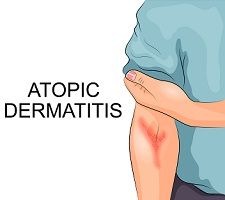Pfizer Initiates Phase 3 PF-04965842 Program for Atopic Dermatitis
Based off positive phase 2b trial results, phase 3 will evaluate the safety and efficacy of PF-04965842.

Pfizer has announced the initiation of a phase 3 program evaluating the safety and efficacy of the once-daily Janus kinase 1 (JAK1) inhibitor PF-04965842, for the treatment of moderate-to-severe atopic dermatitis (AD).
The phase 3 randomized, parallel-group trial designed to evaluate the efficacy and safety of PF-04965842 in 375 patients 12 years and older with moderate-to-severe AD, is the first trial in the JAK1 Atopic Dermatitis Efficacy and safety (JADE) global development program.
“By initiating this phase 3 program in atopic dermatitis, we hope to provide a new potential treatment option for people suffering with this condition,” Michael Corbo, chief development officer, inflammation and immunology, Pfizer Global Product Development, said in a statement.
The study will evaluate the efficacy and safety of 2 dosage strengths, 100 mg and 200 mg, taken once daily, over 12 weeks — the same duration as the phase 2b study, B7451006. Eligible patients will have the option to enter a 4-week safety follow-up period or long-term extension study B7451015 at week 12.
Primary outcome measures include the proportion of patients achieving an Investigator Global Assessment (IGA) score of clear (0) or almost clear (1) and a ≥2-point improvement at week 12, as well as the proportion of patients with at least a 75% or greater change from baseline in their Eczema Area and Severity Index (EASI) score at week 12.
Key secondary endpoints include a response based on at least 4 points improvement in pruritus NRS from baseline at weeks 2, 4 and 12; a change from baseline at week 12 in the Pruritus and Symptoms Assessment for Atopic Dermatitis (PSAAD); a response based on at least 4 points improvement in pruritus NRS from baseline at weeks 8 and 16 (follow-up); time to achieve a 4-point improvement in pruritus NRS from baseline to day 15; response based on 75% improvement from baseline in EASI at week 2, 4, 8 and 16 (follow-up); response based on the IGA for clear (0) or almost clear (1) and ≥2 point reduction from baseline at week 2, 4, 8 and 16 (follow-up); and safety measures like the incidence of treatment emergent adverse and laboratory abnormalities.
Patients participating in the study must have a diagnosis of AD for at least 1 year and current status of moderate to severe disease with ≥ the following scores: BSA 10%, IGA 3, EASI 16, Pruritus NRS 4, a recent history of inadequate response or inability to tolerate topical AD treatments or require systemic treatments for AD control, and be of 12 years of age or older with a minimum body weight of 88 pounds.
PF-04965842 is a small oral molecule that selectively inhibits JAK1 which modulates multiple cytokines involved in pathophysiology of AD including interleukin and interferon gamma.
The design of the trial is based on the phase 2 results presented in September at the Congress of the European Academy of Dermatology and Venereology.
The phase 2b trial findings concluded that treatment with PF-04965842 achieved significantly higher response rates and improvement in pruritus versus placebo.
The final data for the primary outcome measure of the phase 3 trial will be collected March 2019.